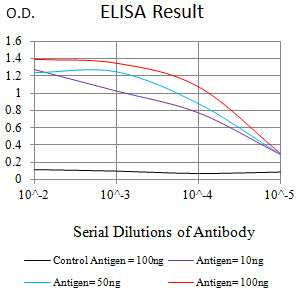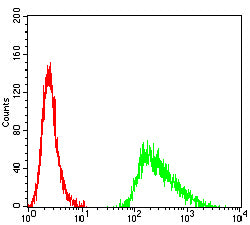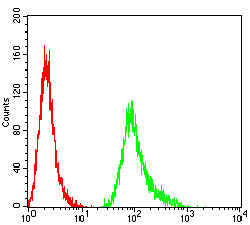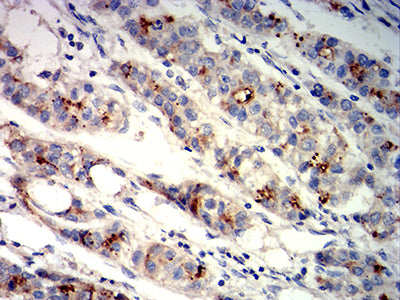




| WB | 1/500 - 1/2000 | Human,Mouse,Rat |
| IF | 咨询技术 | Human,Mouse,Rat |
| IHC | 1/200-1/1000 | Human,Mouse,Rat |
| ICC | 技术咨询 | Human,Mouse,Rat |
| FCM | 1/200-1/400 | Human,Mouse,Rat |
| Elisa | 1/10000 | Human,Mouse,Rat |
| Aliases | SGB; DGSX; MXR7; SDYS; SGBS; OCI-5; SGBS1; GTR2-2 |
| Entrez GeneID | 2719 |
| clone | 2C7E9 |
| WB Predicted band size | 65.5kDa |
| Host/Isotype | Mouse IgG1 |
| Antibody Type | Primary antibody |
| Storage | Store at 4°C short term. Aliquot and store at -20°C long term. Avoid freeze/thaw cycles. |
| Species Reactivity | Human |
| Immunogen | Purified recombinant fragment of human GPC3 (AA: 359-554) expressed in E. Coli. |
| Formulation | Purified antibody in PBS with 0.05% sodium azide |
+ +
以下是3-4篇与GPC3抗体相关的文献摘要(供参考,请核实具体信息):
---
1. **文献名称**: *Targeting Glypican-3 via a Humanized Antibody for Hepatocellular Carcinoma Therapy*
**作者**: Sawada Y, Yoshikawa T, Nobuoka D, et al.
**摘要**: 研究报道了一种人源化抗GPC3抗体(YP7)在肝癌治疗中的应用,证明其可通过抗体依赖性细胞毒性(ADCC)抑制肝癌细胞生长,并在小鼠模型中显著减少肿瘤体积。
2. **文献名称**: *GPC3-Specific CAR T Cells Eradicate Established Solid Tumors without Toxicity*
**作者**: Ishiguro T, Sano Y, Komatsu SI, et al.
**摘要**: 该研究开发了靶向GPC3的嵌合抗原受体T细胞(CAR-T),在肝癌和卵巢癌模型中显示出强效抗肿瘤活性,且未引起显著毒性,提示GPC3抗体在细胞疗法中的潜力。
3. **文献名称**: *Immunohistochemical Detection of Glypican-3 in the Diagnosis of Hepatocellular Carcinoma*
**作者**: Zhu Z, Wang Y, Zhang C, et al.
**摘要**: 通过免疫组化分析GPC3在肝细胞癌(HCC)中的表达,证明其作为特异性诊断标志物的价值,并验证了抗GPC3抗体在病理诊断中的高敏感性和特异性。
4. **文献名称**: *Antibody-Drug Conjugate Targeting Glypican-3 Suppresses Tumorigenesis in Liver Cancer*
**作者**: Feng M, Gao W, Wang R, et al.
**摘要**: 研究构建了靶向GPC3的抗体药物偶联物(ADC),在体外和体内实验中均显示出对肝癌细胞的选择性杀伤作用,为GPC3抗体在精准治疗中的应用提供依据。
---
**注意**:以上信息基于领域内典型研究方向整理,实际文献标题、作者和内容可能需通过数据库(如PubMed)进一步核实。
The glypican-3 (GPC3) antibody targets GPC3. a cell surface heparan sulfate proteoglycan belonging to the glypican family. GPC3 is anchored to the plasma membrane via a glycosylphosphatidylinositol (GPI) moiety and plays roles in cell proliferation, differentiation, and apoptosis regulation by modulating Wnt, Hedgehog, and YAP signaling pathways. Notably, GPC3 is overexpressed in several cancers, particularly hepatocellular carcinoma (HCC), but exhibits minimal expression in healthy adult tissues, making it a promising tumor-specific biomarker and therapeutic target.
GPC3 antibodies, including monoclonal antibodies (mAbs), bispecific antibodies, and antibody-drug conjugates (ADCs), have been developed for diagnostic and therapeutic applications. In diagnostics, GPC3 antibodies aid in immunohistochemical detection of HCC and are explored as serum biomarkers. Therapeutically, they enable targeted approaches: mAbs like Codrituzumab and GC33 block oncogenic signaling or induce antibody-dependent cellular cytotoxicity (ADCC), while CAR-T cells or ADCs linked to cytotoxic agents directly eliminate GPC3-positive tumor cells.
Clinical trials highlight GPC3 antibodies' potential, especially in advanced HCC, though challenges like tumor heterogeneity and resistance mechanisms persist. Research continues to optimize antibody design, combination therapies (e.g., with checkpoint inhibitors), and biomarker-driven patient stratification. Despite no approved GPC3-targeted therapies to date, preclinical and early-phase clinical data underscore its viability as a precision oncology target.
×